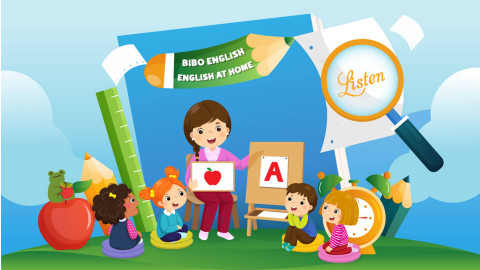Facts To Know When Children Start Learning English

Most parents want their children to be good at English from a young age, because that is a doorway to many opportunities for their child's future. If you want your child to be good at a foreign language, parents will often search and wonder which method is good to teach their child among the numerous methods taught on social networks. Regardless of the method, parents also need to remember the "golden" principles below when teaching children, follow along!
1. BENEFITS OF TEACHING ENGLISH TO CHILDREN FROM CHILDHOOD
Children's brains are stimulated to develop
It is said that “the food of the brain is knowledge”. When we learn, explore, research, our brain will be stimulated and developed. Same thing applies to children. If children are introduced to English early, the brain will be stimulated to develop linguistic intelligence, and multilingual people are very intelligent people.
Children speak English naturally
Imitation is an inherent instinct in children. In the process of language development, thanks to this ability, access and learning becomes easier. When children are exposed early and knowledge is unconsciously absorbed into the brain, they will speak naturally and clearly when they know how to speak.
Children are more confident in learning as well as communicating
Children are comfortable communicating, interacting with parents or teachers in the process of learning English, accordingly, confidence will be formed in children naturally. When having confidence, children can learn very quickly and boldly when communicating with others; which helps children have an open perspective and thinking to make wise choices, effective solutions...
Improved English skills
When exposed to English early, children will have the advantage of outstanding development of listening, speaking, reading and writing skills. Moreover, when exposed to English from a young age, children can be able to apply their knowledge of this language to another language, making it easier for them to learn foreign languages.
2. NUGGETS OF WISDOM FOR TEACHING ENGLISH TO KIDS
Let your child learn as soon as possible
Some parents are afraid that their children can't learn when they are young, so they wait for their older children to teach. However, this is an incorrect notion. When children are exposed to English early, they will learn very quickly, the time they will experience the language will be more. This will help your child master English sooner. In addition, the earlier you learn English, the better your child will speak correctly. The most important time to open the language area is from 0-2 years old and the second most important time is from 2-6 years old. Parents definitely should not miss these 2 golden stages to help children have multilingual abilities.
Let your child learn in a variety of ways
You can let children learn English in many different ways such as through songs, through comics, games, outdoor activities... These forms all help children learn English better but also feel better, more fun, more enjoyable. In 2 courses Bibo English and English At Home of Golden Period, parents will surely find many interesting and unique types of English learning, researched by expert Nguyen Duy Cuong and 3 associates, among them are 1 PhD and 2 teachers from abroad. Parents will not come across any other program that integrates so many unique forms of learning.
Teach without truly teaching
When teaching children, parents need to skillfully put entertainment into the classroom, creating a comfortable feeling so that children can feel that learning English is easy and fun. When children feel happy, learning is more effective.
Practice more than theory
If the class is full of theory, it will easily make children feel bored. Because children's nature is to imitate, be curious, like to explore and discover, parents need to pay more attention to practical exercises so that children can be excited to learn and absorb knowledge effectively. You can let your child play games, sing, act, etc. so that they can use English naturally, with practical applications for example.
Limit learning stereotypes and rigid curriculum
When children are stereotyped into a model curriculum, it will limit creativity. Parents need to pay attention to learning tools (including songs, games, plays, etc.) that are normally easy to find to increase children's activities, especially it is necessary to encourage children to search for more enriching learning tools to improve the learning process, encourage children to listen, speak and communicate in English.
Let children talk as much as possible
Children imitate and follow very quickly and easily, so it can be said that speaking skills are easy to learn when children learn a foreign language. Parents need to create conditions and encourage their children to speak English a lot, even though it may not be fluent at first. When they speak a lot, children become more confident and actively use English more in daily life, and help them gradually pronounce more correctly and naturally.
Get in the habit of processing information and language in English
For example, instead of asking your child "What is a table in English?", you should point to the table and say "What is this?". Besides, do not forget to teach your child how to respond in English reflexively to such questions. Over time, it will create a good habit to teach children to learn English.
Golden Period hopes the above sharing can help parents teach their children to learn English in a fun and effective way.


